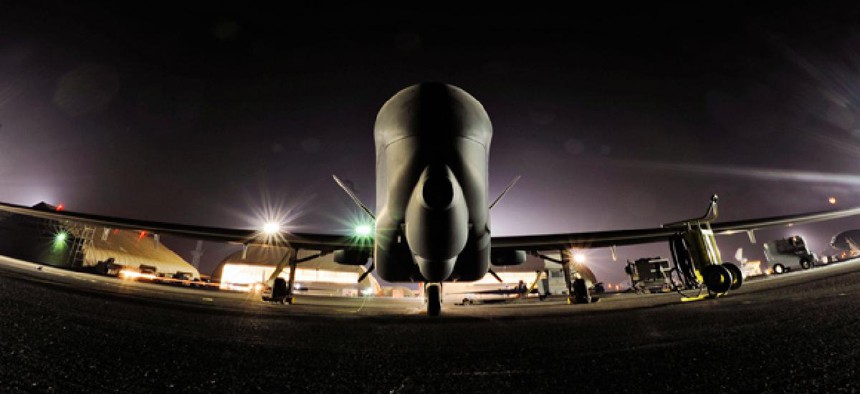Northrop Grumman snags a $782 million sole-source contract for Afghanistan communications

EQ-4 Global Hawk carrying the Battlefield Airborne Communications Node awaits takeoff. U.S. Air Force
The Battlefield Airborne Communications Node is a key relay system.
The Air Force on Wednesday quietly disclosed it had awarded a $782 million sole source contract to Northrop Grumman Corp. to continue operating an airborne communications relay system in Afghanistan through September 2015, pushing the total value of the project to $1.7 billion.
Northrop Grumman began developing the Battlefield Airborne Communications Node in 2006 with two contracts valued at $50 million from the Advanced Technology Support Program managed by the Defense Microelectronics Activity. The Air Force deployed the first system, housed in a Bombardier BDS-700 business jet, in 2008.
Mountainous terrain in Afghanistan interferes with line-of-sight communications systems that ground troops use and BACN (pronounced “bacon”) functions as a high-altitude antenna. It incorporates gateway hardware and software that Northrop Grumman says can bridge the gap between multiple communications systems operating on different frequencies and modulation.
Northrop Grumman said BACN automatically provides translation services between incompatible radios, allowing a troop commander on the ground to use a radio operating on one frequency to easily communicate with the pilot of an aircraft who is operating on another.
The Air Force has deployed three BACN-equipped BD-700 aircraft to Afghanistan and two Northrop Grumman Global Hawk drones packed with BACN gear, with one drone lost in a crash in August 2011.
The Air Force said in a justification and approval document dated April 14 and posted to the FedBizOpps contracting website June 27 that it needed to extend the BACN contract because the current contract ends in June.
The new contract covers continued operation of the three BD-700s and two Global Hawks and ground control systems. The Air Force said it must operate BACN around-the-clock to support communications in Afghanistan and since Northrop Grumman owns the software, no other contractor could meet its requirements on time. The service said it is considering acquisition of a new system with full data rights to replace BACN.
NEXT STORY: A Cyber Summer Camp for All Ages






